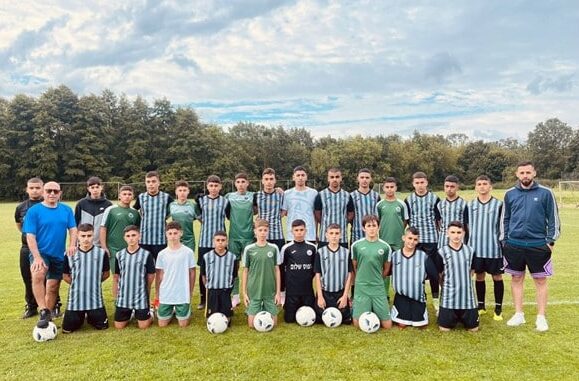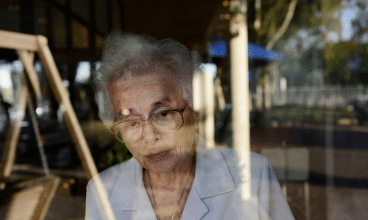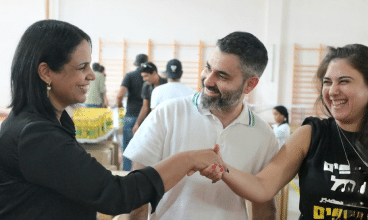Maayan Shalem visiting 7xJung Museum Berlin
As part of the Netzwerk Israel Fellowship, funded by the EVZ Foundation, our fellow Maayan Shalem, together with her partner Shaked Cohen, was able to complete a multi-week internship at the 7xJung Museum in Berlin. Both are part of the artist and educator collective Tarbut Movement in Israel, which is committed to democratic education through art and dialogue.
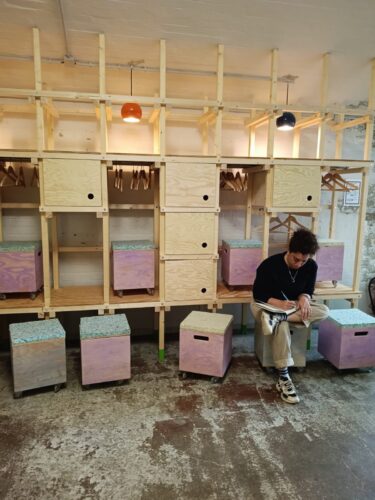
Education in times of crisis
The starting point of their stay was the search for new methods of democratic education in times of crisis and war. In Israel, Maayan and Shaked work in an education system under immense pressure, due to the ongoing war, attacks on democratic principles and structures, racism, and an increasingly extreme public discourse. Teachers are faced with questions they often have no answers to.
The 7xJung Museum in Berlin struck them as the ideal place to learn: an institution that not only preserves a culture of remembrance but also develops a new language from it. Through art, play, and dialogue, the museum enables young people to engage with history and connect it to contemporary questions.
At the same time, Maayan and Shaked aimed to bring their experiences in Israel into an international conversation. They see the strengthening of democratic forces not only as a local task but as a global responsibility.
As part of their fellowship, meeting educators and artists in Germany who are also grappling with the rise of the far right, racism, and how to deal with historical guilt was a twofold opportunity: to learn from one another and to build a network of mutual support.
Maayan and Shaked gained insights into the museum team’s work and how programs can be adapted to the needs of educators. They learned how the history of the Holocaust can be made relevant to young people in very different contexts—and how creative practice can open the door to authentic dialogue.
To deepen their experience, they participated in various youth workshops and observed how facilitators guided sensitive and courageous discussions. They conducted interviews with educators and students, each offering a different perspective on the process. In parallel, they began developing initial ideas on how to translate the methods into Hebrew and adapt them to Israeli classrooms.
What they took from the experience
During their stay, Maayan and Shaked had a key experience: art can be a way to start conversations about difficult topics. For them, it was particularly moving to witness how openly and positively students responded to creative work—and how it helped them find their own way to express thoughts and emotions.
What left a lasting impression was the sense of hope: meeting educators and artists who confront heavy topics like responsibility, guilt, and fear on a daily basis—without losing their optimism. Equally important was the experience of being part of an international network of democratic educators who face similar challenges and support one another. This awareness gave them a moment to breathe—and the strength to continue their work in Israel.
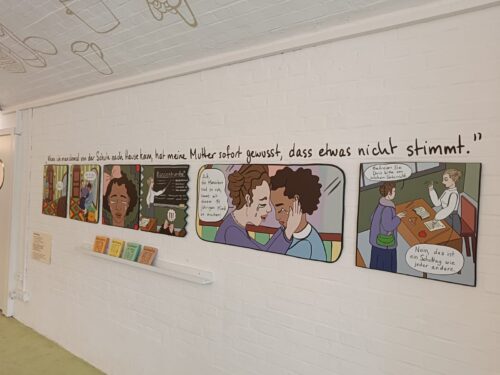
CHALLENGES AND OUTLOOK
The challenges, however, remain significant: in Israel, the education system is exhausted by the war, young people increasingly resort to extreme language, and many teachers are losing confidence in their ability to foster democratic dialogue.
Looking ahead, Maayan and Shaked plan to return to Berlin to deepen their collaboration, continue observing and learning, and develop new methods. They also aim to bring a small delegation of teachers from the Tarbut Movement to Berlin—not as visitors, but as colleagues, contributing their own experiences and outcomes. In parallel, they are working on an article about their journey, as well as on educational materials in Hebrew, so that the methods they encountered can soon be implemented in Israeli schools and youth groups.
Conclusion
For Maayan and Shaked, their time in the framework of the Netzwerk Israel Fellowship marked the beginning of a larger process: building an international network of educators and artists who understand that the commitment to democracy, freedom, and an open society is a shared, courageous, and ongoing one.
Where you can provide support
